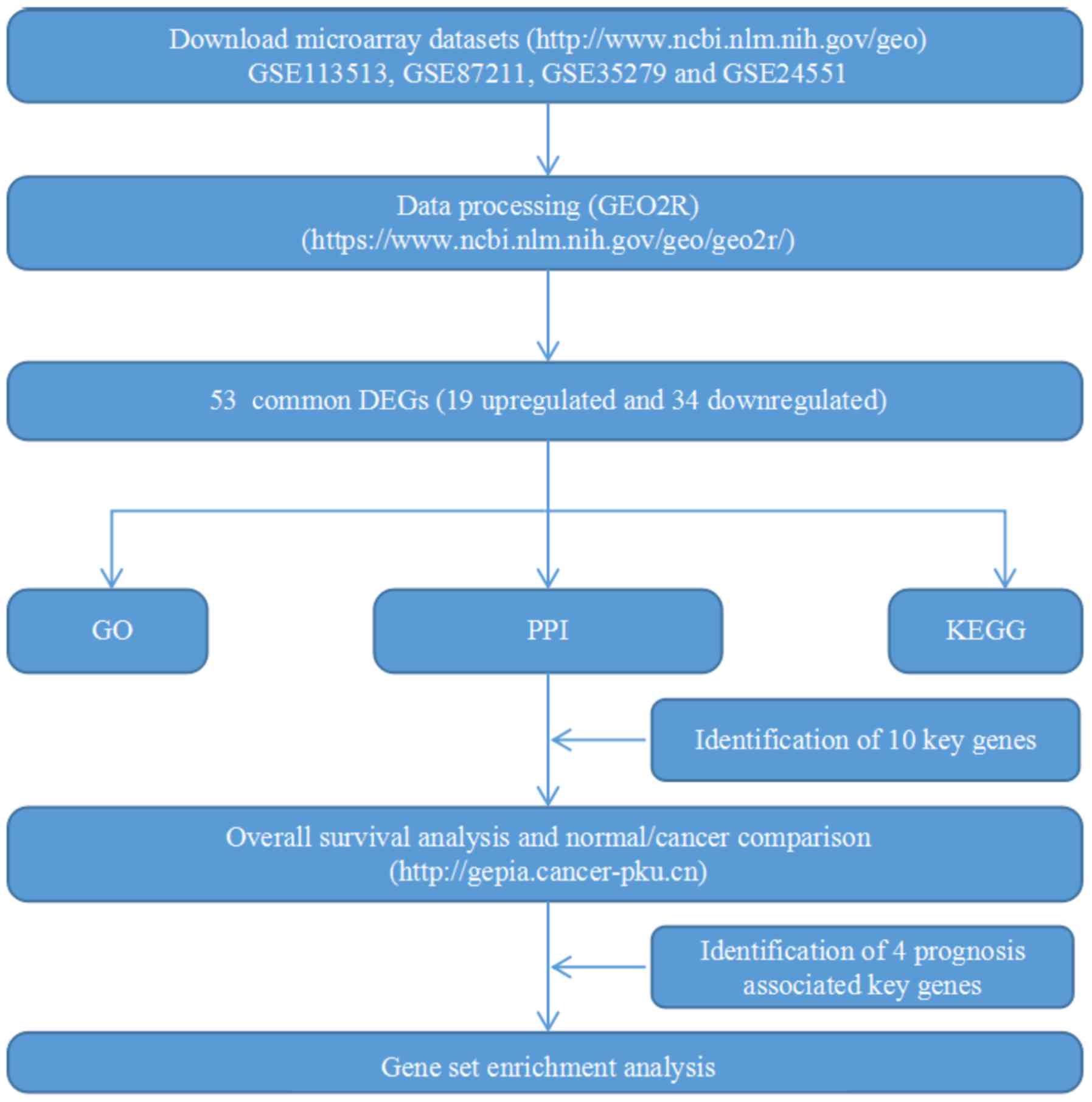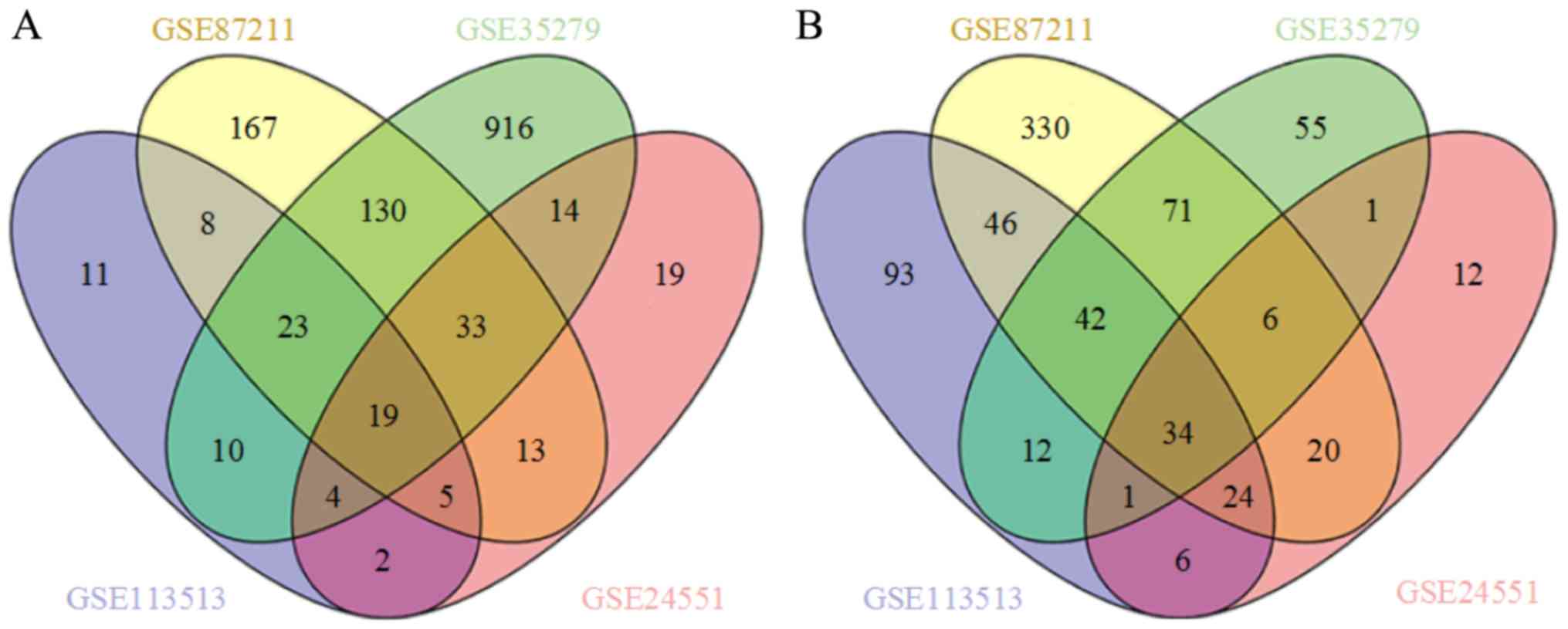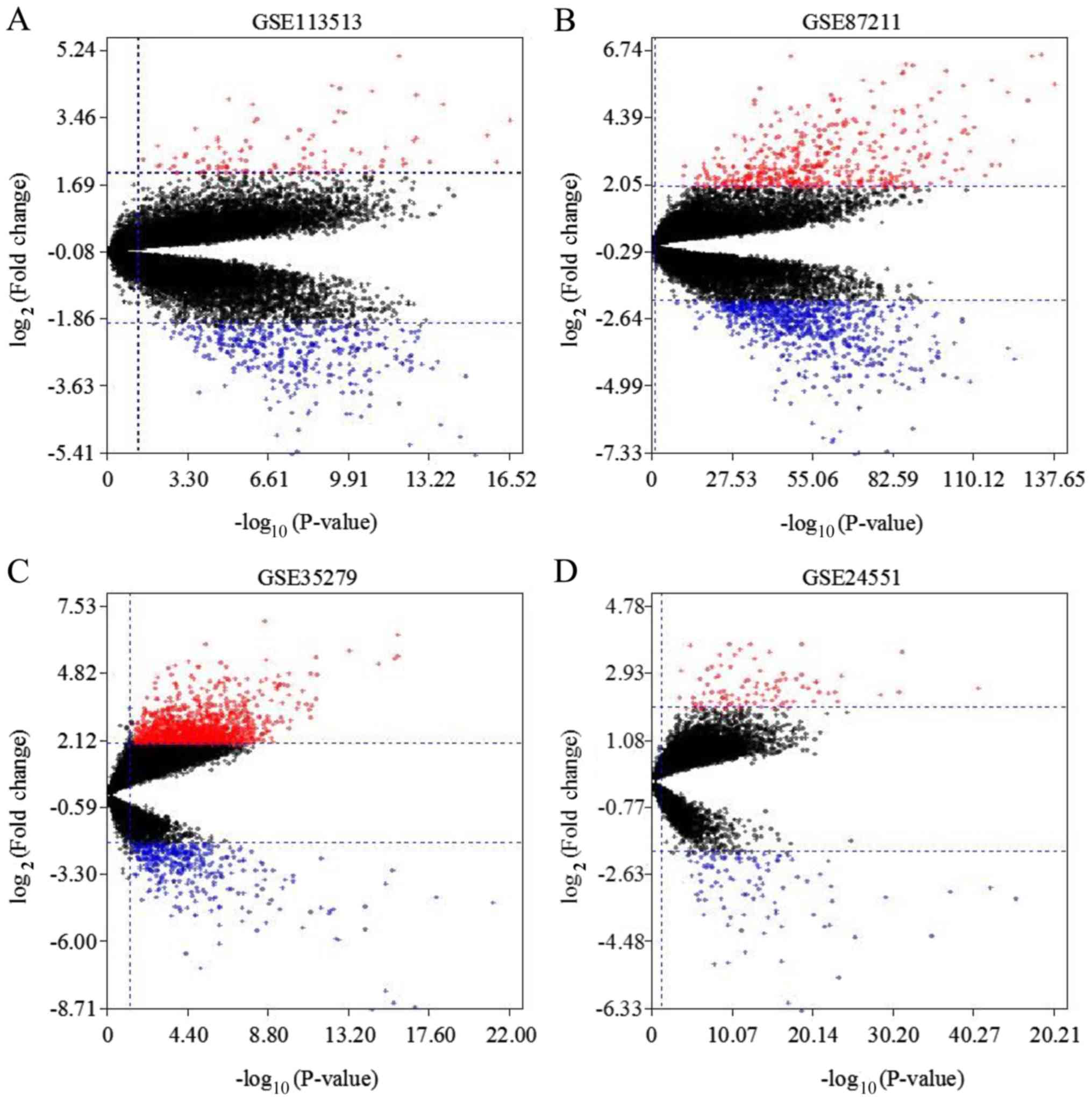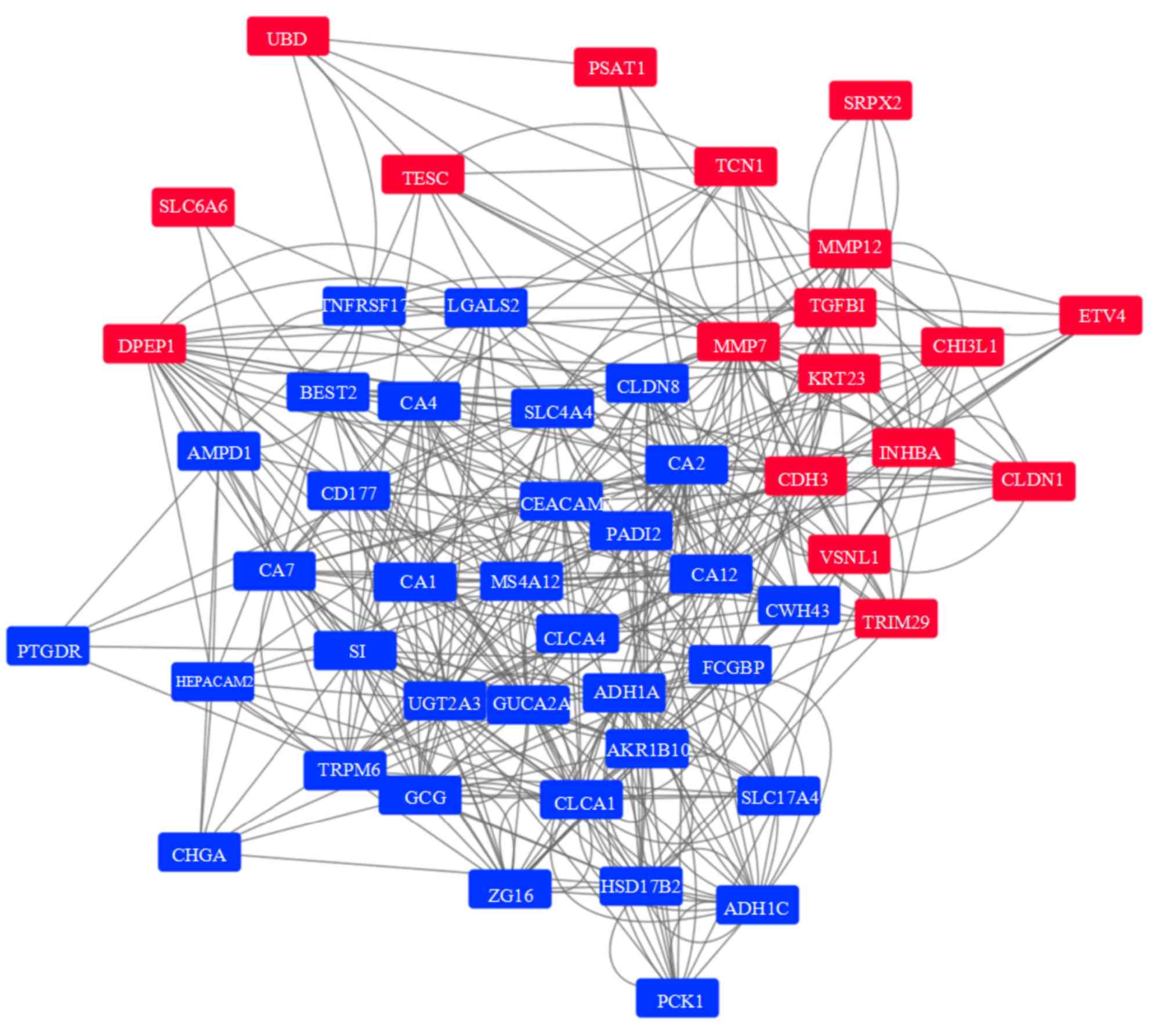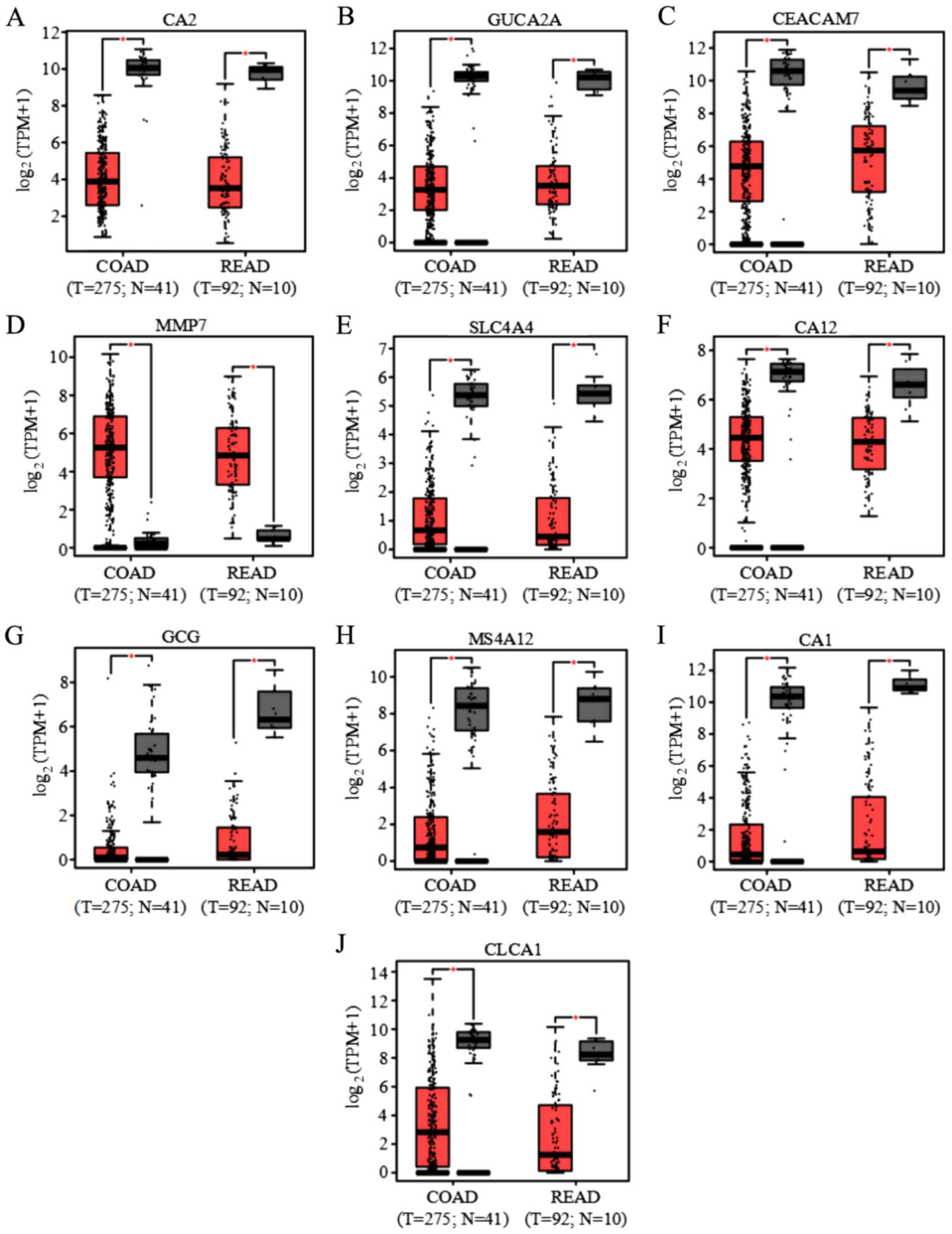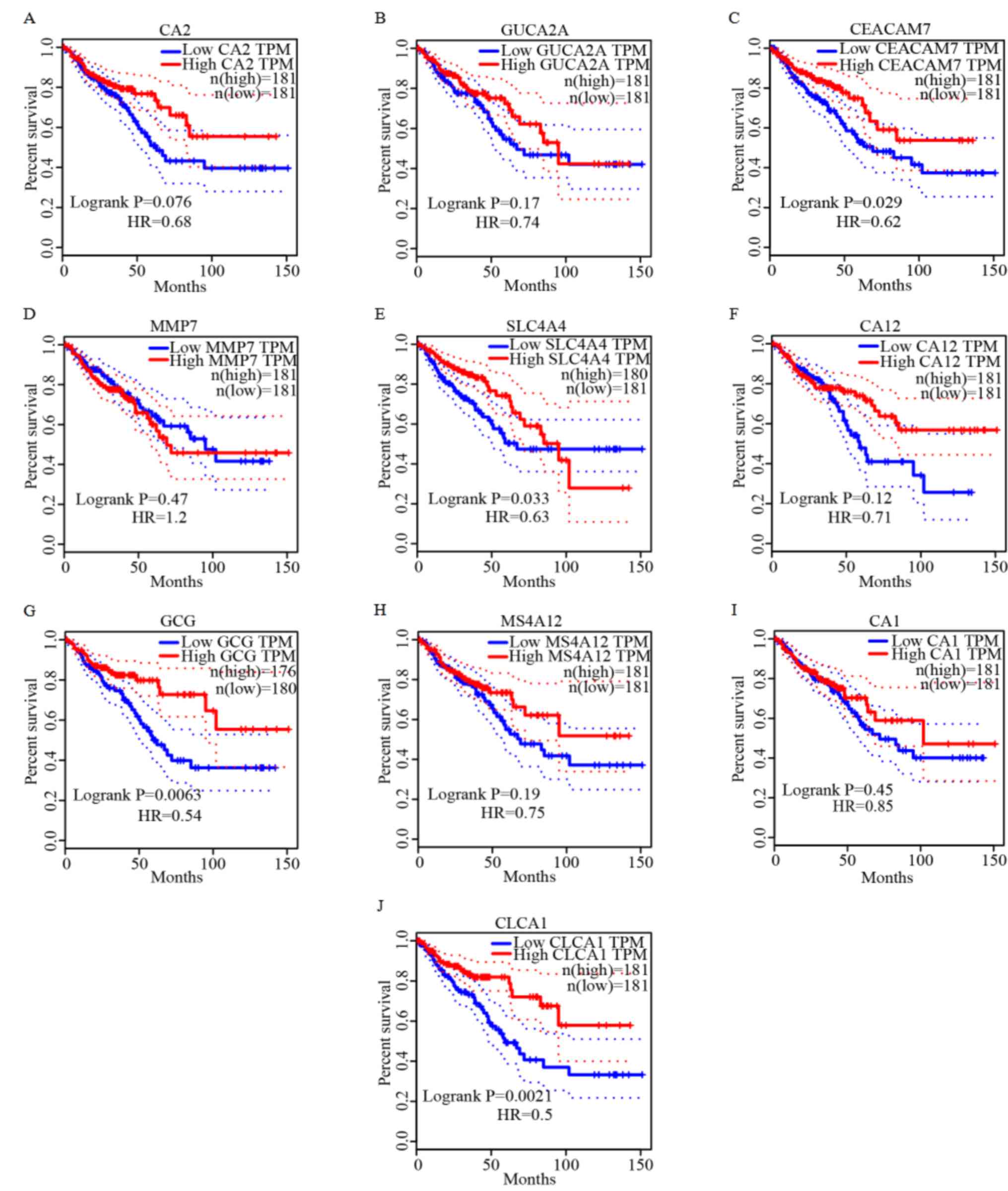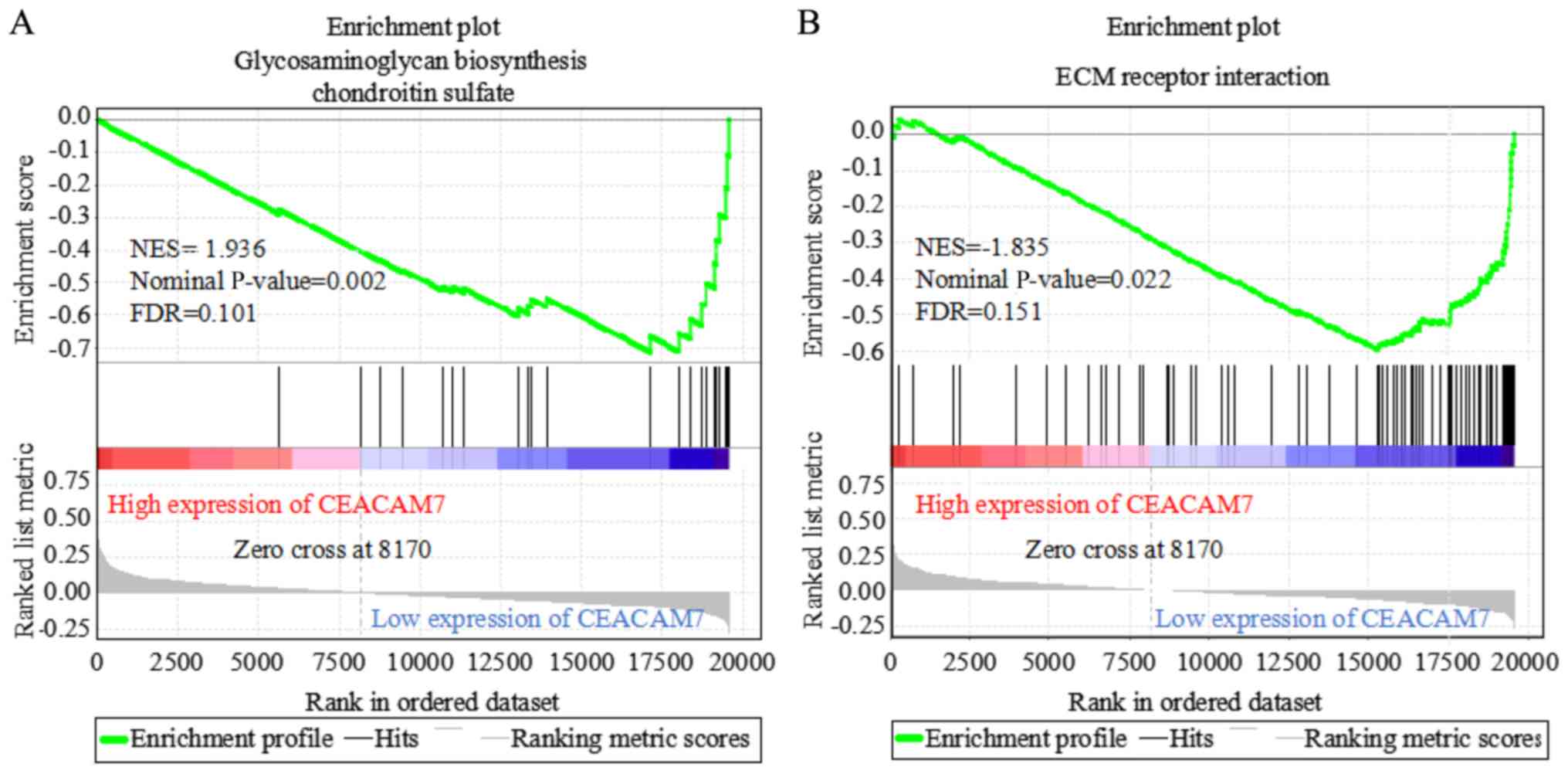|
1
|
Bray F, Ferlay J, Soerjomataram I, Siegel
RL, Torre LA and Jemal A: Global cancer statistics 2018: GLOBOCAN
estimates of incidence and mortality worldwide for 36 cancers in
185 countries. CA Cancer J Clin. 68:394–424. 2018. View Article : Google Scholar : PubMed/NCBI
|
|
2
|
SEER Cancer Statistics Factsheets, . Colon
and Rectum Cancer. National Cancer Institute; Bethesda, MD: 2018,
http://seer.cancer.gov/statfacts/html/colorect.htmlFebruary.
2018
|
|
3
|
Siegel R, DeSantis C, Virgo K, Stein K,
Mariotto A, Smith T, Cooper D, Gansler T, Lerro C, Fedewa S, et al:
Cancer treatment and survivorship statistics, 2012. CA Cancer J
Clin. 62:220–241. 2012. View Article : Google Scholar : PubMed/NCBI
|
|
4
|
American Cancer Society, Colorectal Cancer
Facts & Figures 2014–2016, . American Cancer Society; Atlanta,
Ga, USA: pp. 72014
|
|
5
|
Brenner H, Kloor M and Pox CP: Colorectal
cancer. Lancet. 383:1490–1502. 2014. View Article : Google Scholar : PubMed/NCBI
|
|
6
|
Hu Y, Gaedcke J, Emons G, Beissbarth T,
Grade M, Jo P, Yeager M, Chanock SJ, Wolff H, Camps J, et al:
Colorectal cancer susceptibility loci as predictive markers of
rectal cancer prognosis after surgery. Genes Chromosomes Cancer.
57:140–149. 2018. View Article : Google Scholar : PubMed/NCBI
|
|
7
|
Kagawa Y, Matsumoto S, Kamioka Y, Mimori
K, Naito Y, Ishii T, Okuzaki D, Nishida N, Maeda S, Naito A, et al:
Cell cycle-dependent Rho GTPase activity dynamically regulates
cancer cell motility and invasion in vivo. PLoS One. 8:e836292013.
View Article : Google Scholar : PubMed/NCBI
|
|
8
|
Sveen A, Agesen TH, Nesbakken A, Rognum
TO, Lothe RA and Skotheim RI: Transcriptome instability in
colorectal cancer identified by exon microarray analyses:
Associations with splicing factor expression levels and patient
survival. Genome Med. 3:322011. View
Article : Google Scholar : PubMed/NCBI
|
|
9
|
Agesen TH, Sveen A, Merok MA, Lind GE,
Nesbakken A, Skotheim RI and Lothe RA: ColoGuideEx: A robust gene
classifier specific for stage II colorectal cancer prognosis. Gut.
61:1560–1567. 2012. View Article : Google Scholar : PubMed/NCBI
|
|
10
|
Liu YR, Hu Y, Zeng Y, Li ZX, Zhang HB,
Deng JL and Wang G: Neurexophilin and PC-esterase domain family
member 4 (NXPE4) and prostate androgen-regulated mucin-like protein
1 (PARM1) as prognostic biomarkers for colorectal cancer. J Cell
Biochem. 120:18041–18052. 2019.PubMed/NCBI
|
|
11
|
Pan F, Chen T, Sun X, Li K, Jiang X,
Försti A, Zhu Y and Lai M: Prognosis prediction of colorectal
cancer using gene expression profiles. Front Oncol. 9:2522019.
View Article : Google Scholar : PubMed/NCBI
|
|
12
|
Song X, Tang T, Li C, Liu X and Zhou L:
CBX8 and CD96 are important prognostic biomarkers of colorectal
cancer. Med Sci Monit. 24:7820–7827. 2018. View Article : Google Scholar : PubMed/NCBI
|
|
13
|
Yong L, YuFeng Z and Guang B: Association
between PPP2CA expression and colorectal cancer prognosis tumor
marker prognostic study. Int J Surg. 59:80–89. 2018. View Article : Google Scholar : PubMed/NCBI
|
|
14
|
Li Y, Jiang Q, Ding Z, Liu G, Yu P, Jiang
G, Yu Z, Yang C, Qian J, Jiang H and Zou Y: Identification of a
common different gene expression signature in ischemic
cardiomyopathy. Genes (Basel). 9(pii): E562018. View Article : Google Scholar : PubMed/NCBI
|
|
15
|
Smyth GK: Linear models and empirical
bayes methods for assessing differential expression in microarray
experiments. Stat Appl Genet Mol Biol. 3:Article32004. View Article : Google Scholar : PubMed/NCBI
|
|
16
|
Oliveros JC: VENNY. An interactive tool
for comparing lists with Venn's diagrams. 2007-2015, http://bioinfogp.cnb.csic.es/tools/venny/index.html
|
|
17
|
Ashburner M, Ball CA, Blake JA, Botstein
D, Butler H, Cherry JM, Davis AP, Dolinski K, Dwight SS, Eppig JT,
et al: Gene ontology: Tool for the unification of biology. The gene
ontology consortium. Nat Genet. 25:25–29. 2000. View Article : Google Scholar : PubMed/NCBI
|
|
18
|
The Gene Ontology Consortium, . The gene
ontology resource: 20 years and still GOing strong. Nucleic Acids
Res. 47(D1): D330–D338. 2019. View Article : Google Scholar : PubMed/NCBI
|
|
19
|
Ogata H, Goto S, Sato K, Fujibuchi W, Bono
H and Kanehisa M: KEGG: Kyoto encyclopedia of genes and genomes.
Nucleic Acids Res. 27:29–34. 1999. View Article : Google Scholar : PubMed/NCBI
|
|
20
|
Huang da W, Sherman BT and Lempicki RA:
Systematic and integrative analysis of large gene lists using DAVID
bioinformatics resources. Nat Protoc. 4:44–57. 2009. View Article : Google Scholar : PubMed/NCBI
|
|
21
|
Huang da W, Sherman BT and Lempicki RA:
Bioinformatics enrichment tools: Paths toward the comprehensive
functional analysis of large gene lists. Nucleic Acids Res.
37:1–13. 2009. View Article : Google Scholar : PubMed/NCBI
|
|
22
|
Warde-Farley D, Donaldson SL, Comes O,
Zuberi K, Badrawi R, Chao P, Franz M, Grouios C, Kazi F, Lopes CT,
et al: The GeneMANIA prediction server: Biological network
integration for gene prioritization and predicting gene function.
Nucleic Acids Res. 38((Web Server Issue)): W214–W220. 2010.
View Article : Google Scholar : PubMed/NCBI
|
|
23
|
Tang Z, Li C, Kang B, Gao G, Li C and
Zhang Z: GEPIA: A web server for cancer and normal gene expression
profiling and interactive analyses. Nucleic Acids Res. 45((W1)):
W98–W102. 2017. View Article : Google Scholar : PubMed/NCBI
|
|
24
|
Subramanian A, Tamayo P, Mootha VK,
Mukherjee S, Ebert BL, Gillette MA, Paulovich A, Pomeroy SL, Golub
TR, Lander ES and Mesirov JP: Gene set enrichment analysis: A
knowledge-based approach for interpreting genome-wide expression
profiles. Proc Natl Acad Sci USA. 102:15545–15550. 2005. View Article : Google Scholar : PubMed/NCBI
|
|
25
|
Liberzon A, Subramanian A, Pinchback R,
Thorvaldsdottir H, Tamayo P and Mesirov JP: Molecular signatures
database (MSigDB) 3.0. Bioinformatics. 27:1739–1740. 2011.
View Article : Google Scholar : PubMed/NCBI
|
|
26
|
Shannon P, Markiel A, Ozier O, Baliga NS,
Wang JT, Ramage D, Amin N, Schwikowski B and Ideker T: Cytoscape: A
software environment for integrated models of biomolecular
interaction networks. Genome Res. 13:2498–2504. 2003. View Article : Google Scholar : PubMed/NCBI
|
|
27
|
Koehler JA, Kain T and Drucker DJ:
Glucagon-like peptide-1 receptor activation inhibits growth and
augments apoptosis in murine CT26 colon cancer cells.
Endocrinology. 152:3362–3372. 2011. View Article : Google Scholar : PubMed/NCBI
|
|
28
|
Schölzel S, Zimmermann W, Schwarzkopf G,
Grunert F, Rogaczewski B and Thompson J: Carcinoembryonic antigen
family members CEACAM6 and CEACAM7 are differentially expressed in
normal tissues and oppositely deregulated in hyperplastic
colorectal polyps and early adenomas. Am J Pathol. 156:595–605.
2000. View Article : Google Scholar : PubMed/NCBI
|
|
29
|
Boguski MS: The turning point in genome
research. Trends Biochem Sci. 20:295–296. 1995. View Article : Google Scholar : PubMed/NCBI
|
|
30
|
Thompson J, Zimmermann W, Nollau P,
Neumaier M, Weber-Arden J, Schrewe H, Craig I and Willcocks T:
CGM2, a member of the carcinoembryonic antigen gene family is
down-regulated in colorectal carcinomas. J Biol Chem.
269:32924–32931. 1994.PubMed/NCBI
|
|
31
|
Messick CA, Sanchez J, Dejulius KL, Hammel
J, Ishwaran H and Kalady MF: CEACAM-7: A predictive marker for
rectal cancer recurrence. Surgery. 147:713–719. 2010. View Article : Google Scholar : PubMed/NCBI
|
|
32
|
Afratis N, Gialeli C, Nikitovic D,
Tsegenidis T, Karousou E, Theocharis AD, Pavão MS, Tzanakakis GN
and Karamanos NK: Glycosaminoglycans: Key players in cancer cell
biology and treatment. FEBS J. 279:1177–1197. 2012. View Article : Google Scholar : PubMed/NCBI
|
|
33
|
Mariman EC and Wang P: Adipocyte
extracellular matrix composition, dynamics and role in obesity.
Cell Mol Life Sci. 67:1277–1292. 2010. View Article : Google Scholar : PubMed/NCBI
|
|
34
|
Järveläinen H, Sainio A, Koulu M, Wight TN
and Penttinen R: Extracellular matrix molecules: Potential targets
in pharmacotherapy. Pharmacol Rev. 61:198–223. 2009. View Article : Google Scholar : PubMed/NCBI
|
|
35
|
Llacua LA, Faas MM and de Vos P:
Extracellular matrix molecules and their potential contribution to
the function of transplanted pancreatic islets. Diabetologia.
61:1261–1272. 2018. View Article : Google Scholar : PubMed/NCBI
|
|
36
|
Karamanos NK and Tzanakakis GN:
Glycosaminoglycans: from ‘cellular glue’ to novel therapeutical
agents. Curr Opin Pharmacol. 12:220–222. 2012. View Article : Google Scholar : PubMed/NCBI
|
|
37
|
Theocharis AD, Tsolakis I, Tzanakakis GN
and Karamanos NK: Chondroitin sulfate as a key molecule in the
development of atherosclerosis and cancer progression. Adv
Pharmacol. 53:281–295. 2006. View Article : Google Scholar : PubMed/NCBI
|
|
38
|
Burnham CE, Amlal H, Wang Z, Shull GE and
Soleimani M: Cloning and functional expression of a human kidney
Na+:HCO3- cotransporter. J Biol Chem. 272:19111–19114. 1997.
View Article : Google Scholar : PubMed/NCBI
|
|
39
|
Abuladze N, Lee I, Newman D, Hwang J,
Boorer K, Pushkin A and Kurtz I: Molecular cloning, chromosomal
localization, tissue distribution, and functional expression of the
human pancreatic sodium bicarbonate cotransporter. J Biol Chem.
273:17689–17695. 1998. View Article : Google Scholar : PubMed/NCBI
|
|
40
|
Choi I, Romero MF, Khandoudi N, Bril A and
Boron WF: Cloning and characterization of a human electrogenic
Na+-HCO-3 cotransporter isoform (hhNBC). Am J Physiol.
276:C576–C584. 1999. View Article : Google Scholar : PubMed/NCBI
|
|
41
|
Sun XC and Bonanno JA: Identification and
cloning of the Na/HCO(3-) cotransporter (NBC) in human corneal
endothelium. Exp Eye Res. 77:287–295. 2003. View Article : Google Scholar : PubMed/NCBI
|
|
42
|
Demirci FY, Chang MH, Mah TS, Romero MF
and Gorin MB: Proximal renal tubular acidosis and ocular pathology:
A novel missense mutation in the gene (SLC4A4) for sodium
bicarbonate cotransporter protein (NBCe1). Mol Vis. 12:324–330.
2006.PubMed/NCBI
|
|
43
|
Hong Y, Downey T, Eu KW, Koh PK and Cheah
PY: A ‘metastasis-prone’ signature for early-stage mismatch-repair
proficient sporadic colorectal cancer patients and its implications
for possible therapeutics. Clin Exp Metastasis. 27:83–90. 2010.
View Article : Google Scholar : PubMed/NCBI
|
|
44
|
Skrzypczak M, Goryca K, Rubel T, Paziewska
A, Mikula M, Jarosz D, Pachlewski J, Oledzki J and Ostrowski J:
Modeling oncogenic signaling in colon tumors by multidirectional
analyses of microarray data directed for maximization of analytical
reliability. PLoS One. 5(pii): e130912010. View Article : Google Scholar : PubMed/NCBI
|
|
45
|
Gaedcke J, Grade M, Jung K, Camps J, Jo P,
Emons G, Gehoff A, Sax U, Schirmer M, Becker H, et al: Mutated KRAS
results in overexpression of DUSP4, a MAP-kinase phosphatase, and
SMYD3, a histone methyltransferase, in rectal carcinomas. Genes
Chromosomes Cancer. 49:1024–1034. 2010. View Article : Google Scholar : PubMed/NCBI
|
|
46
|
Notterman DA, Alon U, Sierk AJ and Levine
AJ: Transcriptional gene expression profiles of colorectal adenoma,
adenocarcinoma, and normal tissue examined by oligonucleotide
arrays. Cancer Res. 61:3124–3130. 2001.PubMed/NCBI
|
|
47
|
Kaiser S, Park YK, Franklin JL, Halberg
RB, Yu M, Jessen WJ, Freudenberg J, Chen X, Haigis K, Jegga AG, et
al: Transcriptional recapitulation and subversion of embryonic
colon development by mouse colon tumor models and human colon
cancer. Genome Biol. 8:R1312007. View Article : Google Scholar : PubMed/NCBI
|
|
48
|
Sabates-Bellver J, Van der Flier LG, de
Palo M, Cattaneo E, Maake C, Rehrauer H, Laczko E, Kurowski MA,
Bujnicki JM, Menigatti M, et al: Transcriptome profile of human
colorectal adenomas. Mol Cancer Res. 5:1263–1275. 2007. View Article : Google Scholar : PubMed/NCBI
|
|
49
|
Janssen P, Rotondo A, Mulé F and Tack J:
Review article: A comparison of glucagon-like peptides 1 and 2.
Aliment Pharmacol Ther. 37:18–36. 2013. View Article : Google Scholar : PubMed/NCBI
|
|
50
|
Cho YM, Fujita Y and Kieffer TJ:
Glucagon-like peptide-1: Glucose homeostasis and beyond. Annu Rev
Physiol. 76:535–559. 2014. View Article : Google Scholar : PubMed/NCBI
|
|
51
|
Larsson SC, Orsini N and Wolk A: Diabetes
mellitus and risk of colorectal cancer: A meta-analysis. J Natl
Cancer Inst. 97:1679–1687. 2005. View Article : Google Scholar : PubMed/NCBI
|
|
52
|
Jiang Y, Ben Q, Shen H, Lu W, Zhang Y and
Zhu J: Diabetes mellitus and incidence and mortality of colorectal
cancer: A systematic review and meta-analysis of cohort studies.
Eur J Epidemiol. 26:863–876. 2011. View Article : Google Scholar : PubMed/NCBI
|
|
53
|
Deng L, Gui Z, Zhao L, Wang J and Shen L:
Diabetes mellitus and the incidence of colorectal cancer: An
updated systematic review and meta-analysis. Dig Dis Sci.
57:1576–1585. 2012. View Article : Google Scholar : PubMed/NCBI
|
|
54
|
Krämer HU, Schöttker B, Raum E and Brenner
H: Type 2 diabetes mellitus and colorectal cancer: Meta-analysis on
sex-specific differences. Eur J Cancer. 48:1269–1282. 2012.
View Article : Google Scholar : PubMed/NCBI
|
|
55
|
Zanders MM, Vissers PA, Haak HR and van de
Poll-Franse LV: Colorectal cancer, diabetes and survival:
Epidemiological insights. Diabetes Metab. 40:120–127. 2014.
View Article : Google Scholar : PubMed/NCBI
|
|
56
|
Rowland KJ, Trivedi S, Lee D, Wan K,
Kulkarni RN, Holzenberger M and Brubaker PL: Loss of glucagon-like
peptide-2-induced proliferation following intestinal epithelial
insulin-like growth factor-1-receptor deletion. Gastroenterology.
141:2166–2175.e7. 2011. View Article : Google Scholar : PubMed/NCBI
|
|
57
|
Shi X, Li X, Wang Y, Zhang K, Zhou F, Chan
L, Li D and Guan X: Glucagon-like peptide-2-stimulated protein
synthesis through the PI 3-kinase-dependent Akt-mTOR signaling
pathway. Am J Physiol Endocrinol Metab. 300:E554–E563. 2011.
View Article : Google Scholar : PubMed/NCBI
|
|
58
|
L'Heureux MC and Brubaker PL:
Glucagon-like peptide-2 and common therapeutics in a murine model
of ulcerative colitis. J Pharmacol Exp Ther. 306:347–354. 2003.
View Article : Google Scholar : PubMed/NCBI
|
|
59
|
Rowland KJ and Brubaker PL: Life in the
crypt: A role for glucagon-like peptide-2? Mol Cell Endocrinol.
288:63–70. 2008. View Article : Google Scholar : PubMed/NCBI
|
|
60
|
Thulesen J, Hartmann B, Hare KJ, Kissow H,
Ørskov C, Holst JJ and Poulsen SS: Glucagon-like peptide 2 (GLP-2)
accelerates the growth of colonic neoplasms in mice. Gut.
53:1145–1150. 2004. View Article : Google Scholar : PubMed/NCBI
|
|
61
|
Gruber AD, Elble RC, Ji HL, Schreur KD,
Fuller CM and Pauli BU: Genomic cloning, molecular
characterization, and functional analysis of human CLCA1, the first
human member of the family of Ca2+-activated Cl- channel proteins.
Genomics. 54:200–214. 1998. View Article : Google Scholar : PubMed/NCBI
|
|
62
|
Yang B, Cao L, Liu B, McCaig CD and Pu J:
The transition from proliferation to differentiation in colorectal
cancer is regulated by the calcium activated chloride channel A1.
PLoS One. 8:e608612013. View Article : Google Scholar : PubMed/NCBI
|
|
63
|
Yang B, Cao L, Liu J, Xu Y, Milne G, Chan
W, Heys SD, McCaig CD and Pu J: Low expression of chloride channel
accessory 1 predicts a poor prognosis in colorectal cancer. Cancer.
121:1570–1580. 2015. View Article : Google Scholar : PubMed/NCBI
|
|
64
|
Li X, Hu W, Zhou J, Huang Y, Peng J, Yuan
Y, Yu J and Zheng S: CLCA1 suppresses colorectal cancer
aggressiveness via inhibition of the Wnt/beta-catenin signaling
pathway. Cell Commun Signal. 15:382017. View Article : Google Scholar : PubMed/NCBI
|















